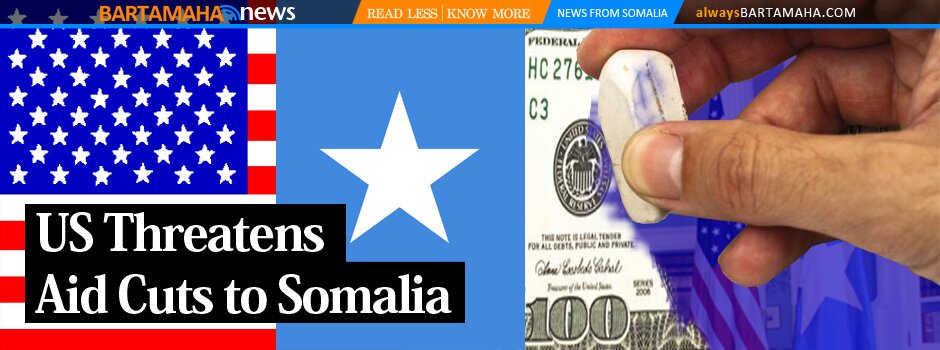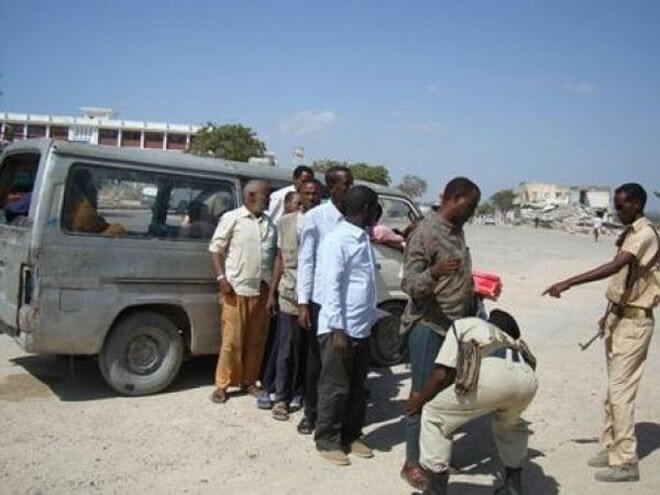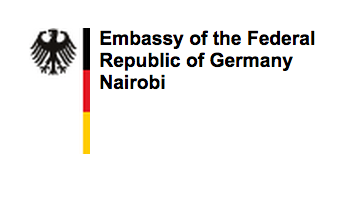Plight of Somali refugees examined
Caitlin O’Neil – The Lantern (OSU)
A young Somali man was shot twice by officials when he tried to flee the country years ago, and is now paralyzed.Â
He never had an X-ray and although today he remains in constant pain, the only medicine he recieves is a few aspirin every day.
A photograph of this man was one of many shown by photographer Abdi Roble and writer Doug Rutledge during their presentation on the Somali Diaspora on Friday at the Hale Center.
“Our mission is to document the Somali Diaspora worldwide,” Rutledge said. “We’re asking, ‘Where do they go?’ The answer is usually refugee camps. In Kenya there’s 275,000 people, with about 1,000 still arriving each day.”
Roble, a Columbus resident who immigrated to the United States from Somalia in 1989, has been working alongside Rutledge since 2003 to document the lives of Somali immigrants, both in the United States and in Kenya’s refugee camps, as well as in places such as Germany, Greece and Malta. All camps were created after the civil war begin in Somalia in 1991.Â
Roble and Rutledge were joined by project manager Tariq Tarey for the Somali Documentary Project and its first book, “The Somali Diaspora: A Journey Away.”
“In the camps, the medical care is inadequate, the student-to-teacher ratio is about 1-to-100, and most students can’t get into high school because there’s no enough room for them,” Rutledge said. “There were thousands waiting outside the camps to get in; it could take up the three years.”Â
One of the first places Rutledge and Roble discussed during the presentation, sponsored by the Kirwan Institute for the Study of Race and Ethnicity, was life at a refugee camp in Kenya.Â
When the refugees first arrive over the border at the camps, they have to be established as either war refugees or economic refugees, Rutledge said.
“The people waiting have to be interviewed to find this out, which is why it takes so long to get into a camp,” Rutledge said. “The Geneva Conventions say if they’re a war refugee, they have the right to travel and other things, but if they’re an economic refugee, they’re not the same rights.”
When Rutledge and Roble came back to Columbus, they were able to raise $25,000 for the refugees. About $8,000 was spent on textbooks with $17,000 spent on desks and chairs for schools in camps.
The pair also discussed the conditions for refugees in Germany.
“In Germany, they’re not given the rights of war refugees,” Rutledge said. “Geneva Conventions say they can’t send them back to a war zone, but why are they being held in a tank for five years?”
Although Germany does give refugees medical care, Roble said that refugees are not allowed to travel beyond 50 kilometers away. He described one man he met in Germany.
“The place this man lives in is a small, little room,” Roble said. “Because he has kidney problems and needs medical attention, he has to work from 7 a.m. until 3 p.m. Working 40 hours a week he makes 57 euros for himself and the rest goes to medical attention. It’s a very desperate situation.”
The pair also spoke of the hardships and dangers refugees face while on the escape route from Somalia. Rutledge spoke of a woman the pair met while on this project. The woman had survived Ethiopian rocket attacks in her neighborhood.
“Her family couldn’t get all of them out, but they got her out,” Rutledge said. “About 30 percent of people die on this trip.”
The woman was arrested in Greece, and held in detention before being set free. She received a card saying she had 30 days to leave the country.
“Her parents raised money for her plane ticket, and then she was arrested for traveling without papers,” Rutledge said. “She had no money, she can’t work and she was released into one of the worse neighborhoods in the world. She can’t stay, she can’t leave and she’s broke.”
Roble spoke of the conditions in Varda in the south of Greece.
“What we encountered was unbelievable,” Roble said. “It was seasonal workers living in abandoned houses. The darker you are, the less you get paid. We asked how they communicated with the outside world. They only had one phone, and it only received incoming calls. They were not allowed to use the Internet; can you imagine?”
Rutledge described the conditions for refugees in Athens, Greece as well.
“In flop houses, you have 50 to 60 people in a room,” Rutledge said. “It’s hot, uncomfortable and it costs about three euros a day. They can’t work, so they have to beg for money. It’s an uncomfortable place to be.”
Rutledge explained that the border to Greece is typical of European borders.
“All of Europe declares itself humanistic, but the people we’ve interviewed should have more rights,” Rutledge said. “A man is shot escaping, and he’s still not treated as a war refugee; it’s amazing.”
According to Rutledge, a U.N. representative with whom the pair spoke said that the U.N. can only do what each country will allow it to do.
“The circumstances don’t change for these people,” Rutledge said. “This means the Maltese government and Greece are breaking the law, not telling the truth and doing something illegal. People are dying. It’s a significant loss of human life.”
Rutledge said many people move from Malta to America because America will declare them war refugees.
“In the U.S. it’s much different for refugees when they get here,” project manager Tariq Tarey said. “They get four months allowance and children under 18 are provided with health care. There is a gap in our system here, but we’re doing much better than Europe, I would say.”
For Roble, after 20 years of being a Somali immigrant in the U.S., it’s been a “culture shock.”
“You have to learn the language and there’s trying to understand the system,” Roble said.
Roble first lived in Virginia before moving to Columbus in 1990. Somali refugees from the civil war started arriving in the U.S. in the mid-90s.
“He figured out how to help and used his camera,” Rutledge said. “He was a little nervous, but once he started the project he couldn’t stop; it’s a lifetime commitment.”
Columbus is home to one of the largest Somali communities in the United States. “There’s support here in Columbus,” Roble said.
“People want to go to a friendly atmosphere,” Rutledge said. “You can understand why one might not want to settle in the southern states as a black immigrant.”
Rutledge and Roble plan to do work on more books after they raise more money to do research. “The Somali Diaspora: A Journey Away” is just the first chapter to completing the story, the pair said.
Progress is being made, even as the pair continues to work on the project.
“I’ve seen kids who we first saw years ago, and who are now enrolled at OSU,” Roble said. “That’s a big change of course.”
Rutledge also spoke of changes in Minneapolis, which is another city with a large Somali population.
“In Minneapolis, there are enough folks there now to influence elections,” Rutledge said. “That’s a big change to have enough people to make a difference.”
The first book of the project, “The Somali Diaspora: A Journey Away” is now on sale, with more books to follow in the next few years.
“It’s both humbling and rewarding to meet people in the most difficult circumstances,” Rutledge said. “People are welcoming and strong in spite of what’s happening to them. It’s humbling to me, because it’s hard to imagine being that strong, and what that life is like in those circumstances.”
Comments
comments
 Calendar
Calendar






































